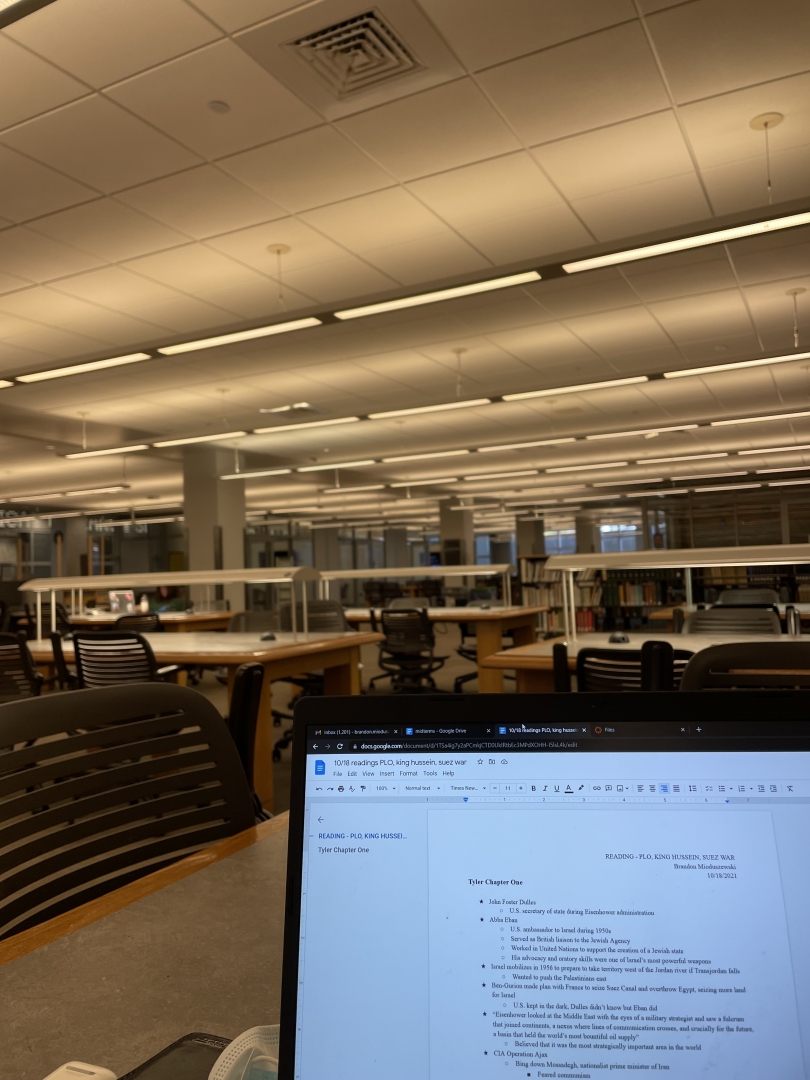

Brandon Mioduszewski


A Freshman's First Midterm Experience
As my fifth week in Hanover comes to an end, I have the opportunity to start reflecting on my first experience with midterms. As a product of Dartmouth's quarter system, these important exams tend to sneak up on students rather quickly. While some courses go without midterms, many midterms come in the forms of in-class tests or lengthy essays due for submission. By detailing how I handled my first midterms as a Dartmouth student, I hope to provide some insight into academic life for prospective students!
My midterm escapades began with my course on the Israel-Palestine conflict. Through this class, I've been able to explore a nuanced perspective on the complex historical and cultural lenses of this seemingly futile conflict. The exam was given through an in-class essay format, with three prompts distributed well in advance. In class, one prompt was drawn from a hat and that is the essay that my peers and I had to answer. This meant that to prepare for the midterm, I had to outline three potential answers to the questions, with the expectation that I would only have to answer one of them. I'm a huge proponent of this format; the questions were complex and forced me to reflect on the readings and lectures that have occurred up to that point. Furthermore, I felt that there were no surprises on the midterm and that the format placed a significant emphasis on actually learning the material through exploring the nuanced questions that Professor Avishai posed.
My next midterm was a little bit different; however, there were also no surprises. For my Intro to Islam course, we were given a blank map of the Middle East and had to mark multiple important cities from early Islamic history on it. In addition, the professor provided a list of critical people and events in Islam, and I had to write a short paragraph detailing my knowledge on these topics. Therefore, the format for this course was more focused on memorization and developing an understanding of important occurrences in Islam.

My final exam was for my Arabic 1 course. The exam was very comprehensive, covering the letters, phrases, and vocabulary that we had studied up to that point. It was given through a more traditional 'test' format that most students would be familiar with in high school. The dictation section, in particular, seemed to be the most difficult; Professor Ouajjani pronounced various Arabic words, and I had to write down the words based on the sounds I heard. Luckily, we practice this type of exercise in class very frequently; once again, there were no surprises.
The underlying similarities between these exams are exactly that: no surprises. After my first midterm experience here at Dartmouth, I've gotten the impression that they're nothing to be afraid of (knock on wood!). The focus of midterm exams seems to be on learning and synthesizing the information learned up to that point, which is refreshing coming from a public school where exams felt like obstacle courses to be navigated through. Through sharing my experience, I hope I was able to alleviate some prospective students' concerns about the academics at Dartmouth!
Posts You Might Like

At most colleges, midterms begin in mid-October, but Dartmouth's 10-week quarter system means they can begin as early as week 3. With the right habits and resources, you can balance your workload with wellness.


Interested in government? Learn more about an introductory government course here!



Hear all about my First-Year Seminar: Seriality in Pop Culture!



Read on about my ice-cream trip to the Lodge this fall!


Now that it's been a few years, I've started thinking about what has made my time here special.


A reflection on how Dartmouth offers countless ways to stay connected to literature and writing—even as a side passion—through blogs, courses, campus publications, and creative communities.


This year, our Homecoming did not feature our traditional large bonfire. Instead, we celebrated via a laser show and some student DJs!


